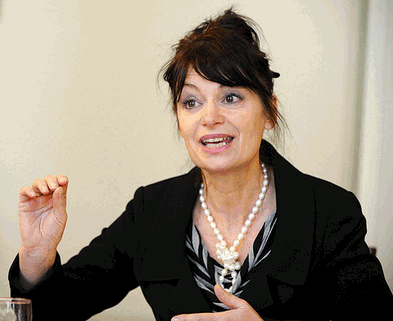|
|
|
|
|
|
|
News & Views item - March 2013 |
![]() EC's First Chief Science Adviser is an "Inspiring Scot" on a Hard Road.
(March 8, 2013)
EC's First Chief Science Adviser is an "Inspiring Scot" on a Hard Road.
(March 8, 2013)
Anne Glover, Professor of Molecular biology and Cell biology at the University of Aberdeen, became Scotland's first chief scientific advisor in 2006. On January 1, 2012 she took up the post of Chief Scientific Adviser to the President of the European Commission, José Manuel Barroso.

Kai Kupferschmidt's profile of Professor Glover is published in today's issue of Science and clearly indicates what a tough job she has in giving the position meaning, as well as showing just how tough she is.
Example: "A 2010 poll found that nearly 60% of Europeans felt scientists could no longer be trusted on controversial issues," and as for staffing she "has no budget of her own and just five staff members—one-half of the size of her team in Scotland."
That said "her duties only start with providing the European Commission's president with expert advice 'on any aspect of science, technology and innovation.' Her official tasks also include analyzing major policy proposals, liaising with institutions such as the European Union's food safety authority, helping with emergency planning, and giving early warning 'on issues that might arise when scientific progress entails either opportunity or threat for the EU.'"
Helga Nowotny, president of the European Research Council told Mr Kupferschmidt: "Unless you really anchor the position of Chief Scientific Advisor] somehow,"[it] will not become a powerful position comparable to the U.S," and Peter Tindemans, secretary general of the researchers' organization Euroscience, believes giving the position so little support is a mistake, but goes on to say "She hasn't yet singled out a small number of key issues on which she would like to make a difference, while agreeing that that her efforts to create a permanent advisory council on science and technology for the commission is a good move.
However he adds, "How much power she can effectively wield also depends very much on her establishing solid ties with scientific advisers or persons or bodies with a similar role in member states."
Kai Kupferschmidt reports Professor Glover sees President Barroso about one-a-month and briefs him "on a variety of topics, including supercomputers, space weather, and dengue fever. The minutes that Glover spends on that floor are the currency in which her political power can be measured, and it is hardly enough to choreograph big changes in Brussel's legendary bureaucracy".
John Holdren, US President Obama's science advisor and head of the administration's Office of Science and Technology Policy is "in and out of Barack Obama's office up to four times a day in the run-up to important decisions".
Nevertheless her assistant and a veteran of European science politics, Jan Marco Müller says: "In some ways, Anne is outside of [the EC's] hierarchical structure. She is a freelance artist," and "Coming from outside the hierarchy can be an advantage if the holder of the position knows how to use it well. And Anne knows how to use it well," says Professor Nowotny.
Professor Glover puts it simply: "The way I interpret it, is that I have independence within the commission, which is a rare advantage."
Neal Lane, a public policy expert at Rice University in Houston, Texas, who served as Bill Clinton's science adviser. makes the observation: "[Those in government] have overriding political considerations and sometimes the science is in the way."
Professor Glover, clearly an optimist, is reported by Mr Kupferschmidt as hoping that: "A network of science advisers could be in place by the end of the year." Having comrades in arms, she acknowledges, would help her and her successors exert greater influence. Last week, the commission announced another step in that direction: the creation of a president's science and technology advisory council. Glover will chair the 15-member group... It will meet with the E.U. president three to four times a year to offer ideas on how to stimulate societal debates about science."
In Dr Müller's view: "If we do our job well, the next president will want a chief scientific adviser as well, maybe even the same one," and a young business woman at a recent luncheon meeting told the Scottish European chief science advisor: "The way you talk and the energy you have is so inspiring."